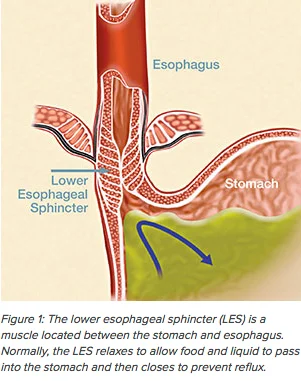Gastroesophageal Reflux Disease or GERD
Acid reflux, commonly associated with GERD (Gastroesophageal reflux disease), affects around 60 million American’s every month, and nearly 25 million people every day. Acid reflux is typically caused by a weak lower esophageal sphincter (LES) that allows stomach acid and bile to leak into the esophagus.
The LES is a muscle that acts as a valve between the stomach and the esophagus. When the LES functions correctly it opens to allow food and liquid to pass into the stomach, then closes to create a barrier between the esophagus and stomach acid. However, in the case of gastroesophageal reflux disease, a weak LES will not close correctly and will allow stomach acid to wash back into the esophagus, often causing injury to the lining of the esophagus and symptoms such as heartburn, chest pain, regurgitation, sore throat, and cough.
Acid reflux, or gastroesophageal reflux disease, can be debilitating and can cause daily pain, poor sleep, food intolerance, and limitations on daily activities. However, there are ways to treat these aggravating symptoms such as various medications, and in severe cases, surgery.
Medications for GERD and acid reflux are designed to control or suppress acid production in the stomach. However it is important to understand that they DO NOT address the cause of gastroesophageal reflux disease and may not prevent reflux.
Unfortunately, approximately 40% of acid reflux and GERD sufferers continue to have symptoms while taking medications.
So you've been officially diagnosed with GERD? Now what.
Complications
When left untreated, GERD (or acid reflux) can lead to potentially serious complications, including:
- Esophagitis (Inflammation, irritation, or swelling of the esophagus)
- Stricture (Narrowing of the esophagus)
- Barrett’s Esophagus (Pre-cancerous changes to the esophagus)
Symptoms
People experience symptoms of acid reflux in a variety of ways. The most common symptom of acid reflux is heartburn. Other symptoms may include:
- Chest pain
- Cough
- Sore throat
- Regurgitation
Did You Know?
Gastroesophageal reflux disease is caused by a weak esophageal sphincter muscle. An estimated 1 in 5 U.S. adults suffer from GERD. The incidence of esophageal adenocarcinoma, a type of cancer linked to GERD, increased over 600% between 1973 and 2006.3Approximately 40% of GERD sufferers continue to have symptoms while taking medications for gastroesophageal reflux disease.



